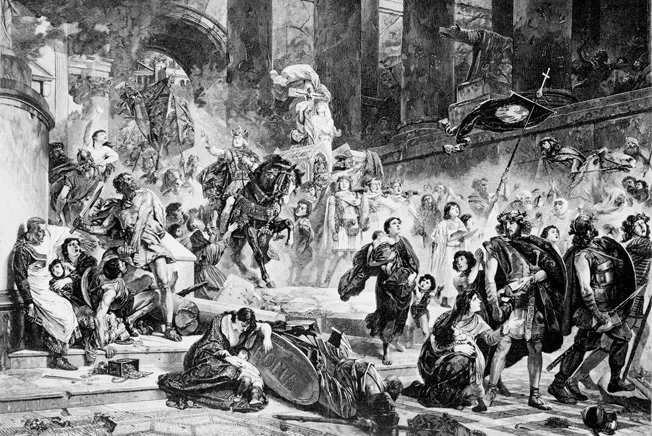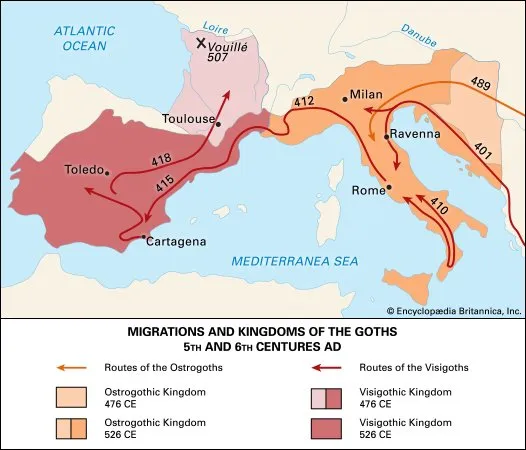Rome had razed Carthage, burned Corinth, buried Numancia, taken Jerusalem, sacked Ctesiphon, and conquered Alexandria, and ruled over countless other cities and nations and it was now time for a reckoning: the Barbarians were inside the Eternal City. The roles were reversed at last and the big pendulum of History slammed right back in the face of the Romans.
Treachery
They pretended to return into their own country, and selected three hundred young men of great strength and courage, whom they bestowed on the Roman nobility as a present, having previously instructed them to oblige their masters by all possible observance, and on a certain day appointed, about noon, when the nobility were either asleep or otherwise unmindful of business, to meet suddenly at the gate called Porta Avinaria, where having surprised and killed the guards, they should open the gate for those who would be there in waiting.
The trick worked and the Eternal City fell into the hands of Alaric. But instead of raining more blows onto an already dilapidated and terrified city, the Gothic king showed something no one expected really of a barbarian: mercy and restraint.
Merciful Alaric
In spite of all the black legend surrounding the siege of Rome by Alaric, the Goths showed great restraint when entering the city. Rome was submitted to three days of looting, but the Goths didn't want to destroy and annihilate the citizenry of the Eternal City. All the sources concur, the sack was a subdued and professional affair, in the words of Edward Gibbons
He encouraged his troops boldly to seize the rewards of valour, and to enrich themselves with the spoils of a wealthy and effeminate people; but he exhorted them at the same time to spare the lives of the unresisting citizens, and to respect the churches of the apostles St. Peter and St. Paul as holy and inviolable sanctuaries. Amidst the horrors of a nocturnal tumult several of the Christian Goths displayed the fervour of a recent conversion; and some instances of their uncommon piety and moderation are related, and perhaps adorned, by the zeal of ecclesiastical writers
Alaric had come a long way from a vulgar barbarian chieftain intent on ruining everything in his path. He was no more the leader a band of marauders, he was the king of the most imposing army inside the Roman Empire and the leader of his people. He negotiated directly with the Emperors, and held the key to the future and the safety of his people.
However, there is no doubt that the sack definitely ratified the demise of Rome as a geopolitical center of the Mediterranean world: the Emperor had barely tried to defend it, and was hiding behind the marshes around Ravenna, unable to muster any help - powerless and aloof. To add insult to injury, Alaric even managed to make Honorius' sister prisoner, Galla Placidia.
What now?
After those three days, Alaric marched his army outside of Rome. After all those sieges and calamities, Rome was barely capable of feeding itself and Alaric could not expect it to feed its army - not to speak about the sanitary situation either.
One of the option was to go straight to Ravenna in order to force the Emperor into a straight battle - or at least to frighten him enough to obtain everything he wanted. But Ravenna was too well fortified, and the surrounding marshes were no place for an army to camp during weeks.
So, Alaric decided to follow the track of the grain he had unsuccessfully tried to obtain from Honorius and this grain was in North Africa. It is an interesting move, for sure, one which would be imitated less than three decades later by the Vandals of Genseric, and he headed straight south along the Via Appia, as explained by Edward Gibbons:
At the head of an army encumbered with rich and weighty spoils, their intrepid leader advanced along the Appian Way into the southern provinces of Italy, destroying whatever dared to oppose his passage, and contenting himself with the plunder of the unresisting country.
Burial and legacy
Unfortunately for Alaric, all his plans came crashing down when a storm destroyed all the boats he had built for the crossing of the sea. His plans shattered, Alaric died in Cosenza a few weeks later, probably of malaria.
The Gothic king was no more, less than a year after putting Rome to the sword. In accordance with his pagans roots, Alaric's body was buried inside the dried-up bed of the river Busento before it was flooded again. He was surrounded with a good amount of the treasures looted from Rome and all the slaves who had dug his grave were killed right after it to conceal its location.
His brother-in-law, Athaulf, was declared the new chief of the Gothic people and, in accordance with Alaric's wish, they headed North again and thereafter left Italy and moved into Gaul. Honorius, too happy to be rid of the Goths, encouraged them to stay there and put down a few rebellion in his name. Athaulf went as far as marrying Galla Placidia, the sister of Honorius who had been captured in the sack of Rome.
The Goths would eventually be officially "allowed" to stay in Gaul and to settle more specifically in Aquitaine. But it would not be the end of it: their indomitable spirit pushed them to invade Hispania, and expand and push the Vandals out. By the end of the 5th century almost all the peninsula would be under the rule of the people we now call Visigoths.
The odyssey of the Goths, from the shores of the Black Sea to the shores of the Atlantic Ocean deserves in itself a whole article. The Goths fled the Huns, ruined the Roman empire, conquered Rome, and - never satisfied - kept going until they came to Spain - before to be wiped out in turn by the Muslim conquest. Alaric was at the forefront of that incredible story. He would not survive the sack of Rome for long, but had managed to break free of the Roman yoke and to gain the world for his people, striking terrors in the hearts of the Romans before to vanish into thin air.

THE END! THANKS FOR READING!

SOURCES
http://www.gutenberg.org/files/28587/28587-h/28587-h.htm
https://en.wikisource.org/wiki/New_History/Book_the_Sixth
http://epublications.marquette.edu/cgi/viewcontent.cgi?article=1007&context=dittman
https://www.ccel.org/g/gibbon/decline/volume1/chap31.htm
PREVIOUS EPISODES
Alaris 8.1 - Let’s Goth to Rome
Alaric 8.2 - Like a Wrecking Ball
Alaric 8.3 - Breaking Loose Ball
Alaric 8.4 - Never Two Without Three
PREVIOUS “ENEMIES OF ROME”
Boudicca - The Warrior Queen
Zenobia - The new Cleopatra
Sertorius - The Last Man Standing
Vercingetorix - One man to rule them all
Arminius - Magna Germania
Genseric - The Vandals are Coming





